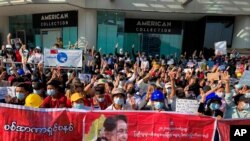Nationwide demonstrations against last week’s military overthrow of Myanmar’s civilian government entered its fifth consecutive day Wednesday, despite the military’s increasing use of force against the protesters.
Security forces fired warning shots, rubber bullets and water cannons at protesters in an effort to disperse the crowds, leading to reports of injuries among the protesters.
An unnamed physician who treated protesters at a Naypyitaw hospital told VOA’s Burmese Service that at least two demonstrators sustained what he believes were live gunshot wounds, one to the head, the other to the chest.
Twenty-year-old Myat Thwe Khine was placed on a ventilator as she slipped into a coma after receiving a gunshot wound to the head, according to the physician, who said X-rays show the bullet is still lodged in her head.
The doctor said Soe Wai, 23, sustained a gunshot wound to the chest.
The doctor could not say how many protesters were injured by bullets or water cannons, but he said most of the 20 people treated at the hospital were not injured by rubber bullets.
More than a week after the military detained de facto leader Aung San Suu Kyi and other senior members of the civilian government, the military increased its pressure on Suu Kyi’s National League for Democracy with a raid on the party’s headquarters in Yangon late Tuesday night.
Tuesday’s protests occurred hours after the military announced an 8 p.m. to 4 a.m. curfew would be imposed in the cities of Yangon and Mandalay, where demonstrations were also held. The regime has also banned gatherings of more than four people across the country.
News agencies say the protesters were blasted with water cannons in all three cities.
The United States on Tuesday condemned violence against the protesters.
“We repeat our calls for the military to relinquish power, restore democratically elected government, release those detained and lift all telecommunications restrictions,” State Department spokesman Ned Price told reporters.
In a statement, the United Nations voiced “strong concern” over the clampdown.
“I call on the security forces to respect human rights and fundamental freedoms, including the right to peaceful assembly and freedom of expression,” U.N. Myanmar Resident Coordinator Ola Almgren said in a statement. “The use of disproportionate force against demonstrators is unacceptable.”
Almgren called on military leaders to respect the will of Myanmar’s citizens, comply with democratic customs and resolve differences through peaceful negotiation.
Tens of thousands of people have come out in force across Myanmar since the demonstrations began, holding signs reading “Save Myanmar,” “We want democracy,” as well as photographs of Aung San Suu Kyi, the de facto leader of the deposed government.
Protesters also raised a three-finger salute as they marched, a sign of resistance against tyranny in the popular “Hunger Games” movies.
The demonstrations entered a new phase Monday as civil servants, railway employees, teachers and workers in other sectors began a nationwide strike.
But Senior Gen. Min Aung Hlaing, who led the coup, made no mention of the unrest in his address to the nation late Monday, his first since taking power a week ago.
The general reiterated claims that last November’s elections, overwhelmingly won by Suu Kyi’s National League for Democracy Party (NLD), were fraudulent. But he promised to hold new elections to bring a "true and disciplined democracy" different from previous eras of military rule.
He did not specify when the new elections would take place. The military has declared a one-year state of emergency.
Suu Kyi remains under house arrest at her official residence in Naypyitaw, according to party spokesman Kyi Toe.
She faces charges of illegally importing and using six unregistered walkie-talkie radios found during a search of her home.
The military takeover has been condemned by U.S. President Joe Biden and other world leaders, who have called for the elected government to be restored to power.
New Zealand said Tuesday it is suspending all high-level military and political contacts with Myanmar and is imposing a travel ban on its leaders.
The United Nations’ Human Rights Council will hold a special session Friday to discuss the crisis.
Myanmar, also known as Burma, has long struggled between civilian and military rule, but until last week had been enjoying a hopeful transition to democracy.
A British colony until 1948, the country was ruled by military-backed dictators from 1962 until 2010.
An uprising in 1988 led to an election in 1990, which the NLD won in a landslide. But the elected members of Parliament were imprisoned, and the dictatorship continued.
Suu Kyi, the daughter of Myanmar's assassinated independence hero, Gen. Aung San, emerged as a leader in the pro-democracy rallies and in the NLD. She was awarded the Nobel Peace Prize in 1991 while under house arrest.
In 2010, Senior Gen. Than Shwe announced the country would be handed over to civilian leaders, who included retired generals. They freed political prisoners, including the lawmakers from the NLD, and Suu Kyi, who was elected in a 2012 by-election and later became the state counsellor of Myanmar.
While popular among Myanmar’s Buddhist majority, the 75-year-old Suu Kyi has seen her international reputation decline over her government’s treatment of the country's mostly Muslim Rohingya minority.
In 2017, an army crackdown against the Rohingya, sparked by deadly attacks on police stations in Rakhine State, led hundreds of thousands of them to flee to neighboring Bangladesh, where they remain.
The International Criminal Court is investigating Myanmar for crimes against humanity.




